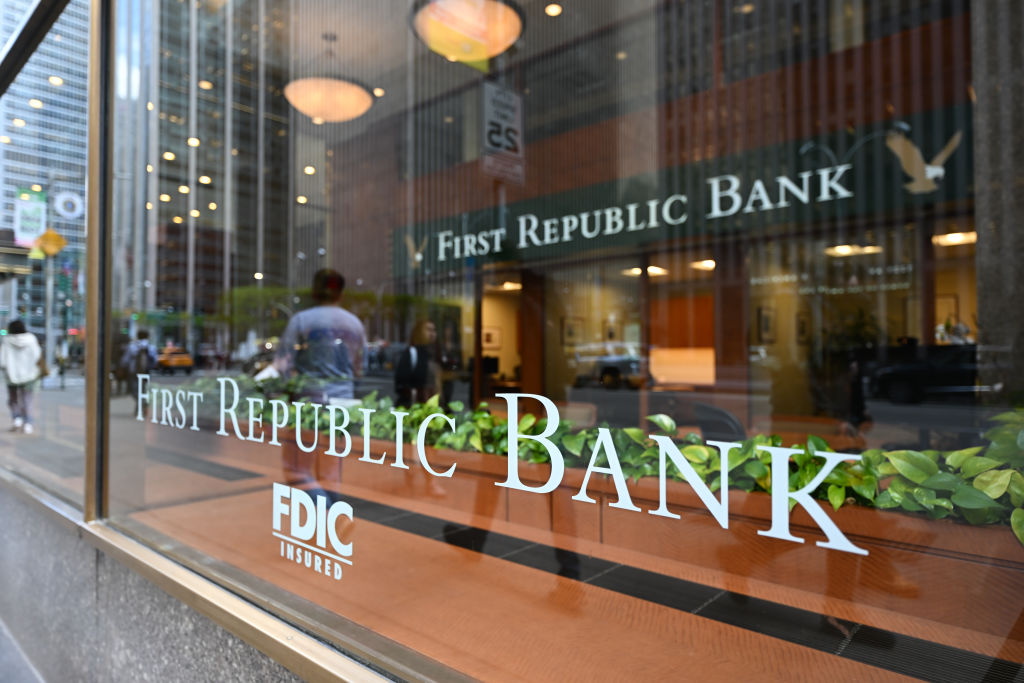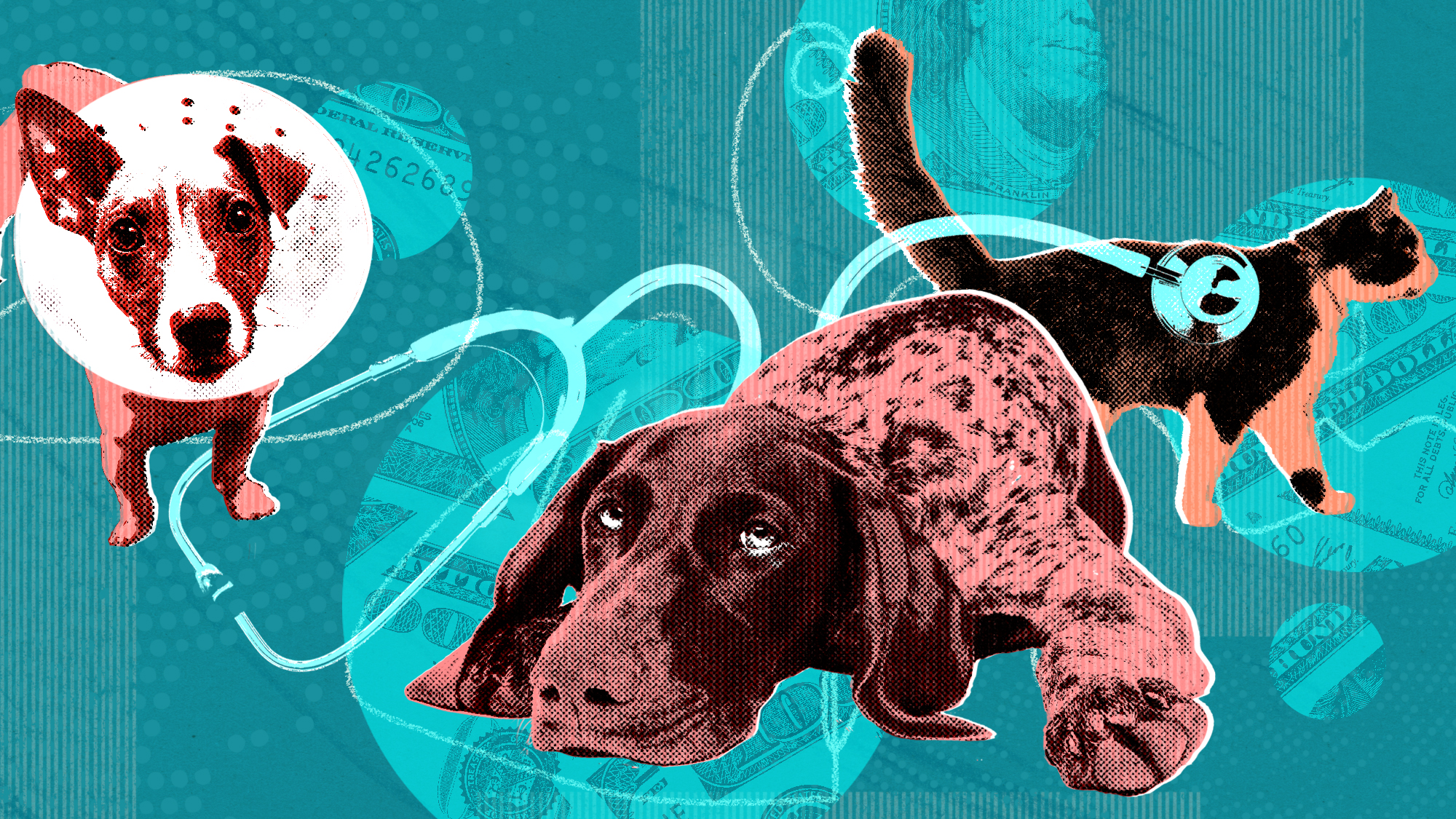The banking crisis is not over
A shotgun marriage tying First Republic to JPMorgan Chase "did nothing to stem worries about the system"

A free daily email with the biggest news stories of the day – and the best features from TheWeek.com
You are now subscribed
Your newsletter sign-up was successful
Here's a look at the smartest insight and analysis, from all perspectives, rounded up from around the web:
A rollercoaster week for regional bank stocks signaled that the banking crisis is not over, said Dan Primack in Axios. The forced sale of First Republic Bank as it collapsed earlier this month didn't reassure investors. Shares of PacWest Bancorp fell by 50 percent after it said it was exploring a possible sale. Reports that Phoenix-based Western Alliance is also seeking help forced halts to trading several times. Last week, PacWest and Western shares rebounded 82 percent and 49 percent, but shares in both banks, as well as in Texas' Comerica and Utah's Zions Bancorp, resumed their tumble this week. Federal Reserve chair Jerome Powell tried to reassure markets by declaring the U.S. banking system is "sound and resilient." But it sounded "akin to a sports team owner giving the coach a vote of confidence" — never a good sign.
Wall Street isn't buying Powell's bromides, said Charles Gasparino in the New York Post. "Banking is a confidence game," and depositors in regional banks have lost confidence. "They're draining the banks of their capital and sending them into insolvency because they don't know what they're backing up, such as increasingly depressed commercial real estate." A shotgun marriage tying First Republic to JPMorgan Chase "did nothing to stem worries about the system," said Amit Seru in The New York Times. Commercial real estate loans make up a quarter of an average bank's assets. While the delinquency rate on commercial mortgages was 2.61 percent in March, "it has been rising fast." If it reaches 10 percent, which is "at the lower end of the range seen during the Great Recession," it would result in about $80 billion to $160 billion in losses that regional banks cannot afford.
The Week
Escape your echo chamber. Get the facts behind the news, plus analysis from multiple perspectives.

Sign up for The Week's Free Newsletters
From our morning news briefing to a weekly Good News Newsletter, get the best of The Week delivered directly to your inbox.
From our morning news briefing to a weekly Good News Newsletter, get the best of The Week delivered directly to your inbox.
"The stock market has been pretty panicky about these banks, but their depositors, for the most part, have not been," said Matt Levine in Bloomberg. This is a case where the stock market is looking at the worst-case scenarios and overreacting, something that stock markets routinely do. It might be that depositors, who added $600 million in cash to Western Alliance the day after First Republic's rescue, might not be ready to flee at all. And that raises an ugly possibility that some short-sellers might be pushing a panic hoping to "cause them to fail."
Short selling bank stocks has to stop, said Liz Hoffman in Semafor. Regulators have restricted short selling — essentially, betting on a company's decline — in the past out of concern for market stability, as in the fall of 2008 and March 2020. "Short sellers play a crucial role" in rational, well-functioning markets by holding businesses accountable, "but this is no longer a well-functioning market." Betting on bank failures can be a self-fulfilling prophecy, said Julia Horowitz in CNN. "Customers may see a drop in their bank's share price, assume it's in trouble, and yank their funds," causing a bank collapse. That's why this situation requires government intervention. Short-selling restrictions would help. So would a U.S. guarantee to protect all deposits, regardless of size. That would buy time until the financial markets calm down.
This article was first published in the latest issue of The Week magazine. If you want to read more like it, you can try six risk-free issues of the magazine here.
A free daily email with the biggest news stories of the day – and the best features from TheWeek.com
-
 Political cartoons for February 16
Political cartoons for February 16Cartoons Monday’s political cartoons include President's Day, a valentine from the Epstein files, and more
-
 Regent Hong Kong: a tranquil haven with a prime waterfront spot
Regent Hong Kong: a tranquil haven with a prime waterfront spotThe Week Recommends The trendy hotel recently underwent an extensive two-year revamp
-
 The problem with diagnosing profound autism
The problem with diagnosing profound autismThe Explainer Experts are reconsidering the idea of autism as a spectrum, which could impact diagnoses and policy making for the condition
-
 Trump wants a weaker dollar, but economists aren’t so sure
Trump wants a weaker dollar, but economists aren’t so sureTalking Points A weaker dollar can make imports more expensive but also boost gold
-
 The longevity economy booms as people live longer
The longevity economy booms as people live longerThe Explainer The sector is projected to reach $27 trillion by 2030
-
 Texas is trying to become America’s next financial hub
Texas is trying to become America’s next financial hubIn the Spotlight The Lone Star State could soon have three major stock exchanges
-
 How could worsening consumer sentiment affect the economy?
How could worsening consumer sentiment affect the economy?Today’s Big Question Sentiment dropped this month to a near-record low
-
 Musk wins $1 trillion Tesla pay package
Musk wins $1 trillion Tesla pay packageSpeed Read The package would expand his stake in the company to 25%
-
 From candy to costumes, inflation is spooking consumers on Halloween this year
From candy to costumes, inflation is spooking consumers on Halloween this yearIn the Spotlight Both candy and costumes have jumped significantly in price
-
 Rising costs are making it harder for people to afford pets
Rising costs are making it harder for people to afford petsUnder the Radar Shelters are filling up as a result
-
 Grocery stores under fire for overcharging during cost-of-living crisis
Grocery stores under fire for overcharging during cost-of-living crisisThe Explainer A recent investigation has put the spotlight on Kroger, but it is not the only chain being pinpointed